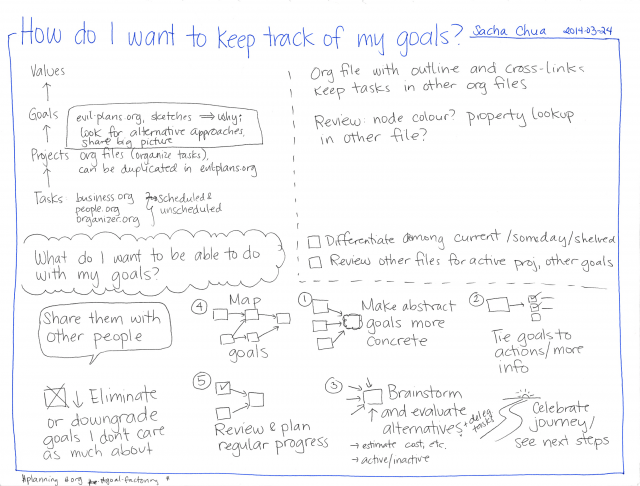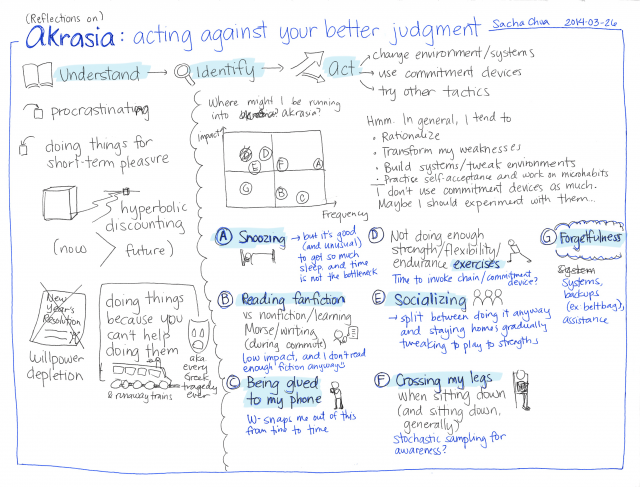How do I develop opinions? What is good to develop opinions about? How can I improve this process?
I've been working on teaching myself design. Good designs and bad designs both take effort to implement, so I might as well focus on good designs. I can read all the usability guidelines I want, but I need an aesthetic sense in order to bring things together into a coherent whole. Hence the need for opinions.
Lots of other areas benefit from opinions, too. Opinions can speed up decisions, save time and money, and help me appreciate subtleties. I'd like to form useful opinions while still being open to changing my mind in the face of good arguments or new evidence.
I don't have a lot of strong opinions. I tend to take things as they are, see the value in multiple viewpoints, and not get too attached to things. I can identify and let go of decisions that don't matter that much to me. In university, I nearly flunked my classes in literature. Art and music are still pretty opaque for me, although I do have a fondness for representational art and self-referential or otherwise punny music. Even when watching movies, I rely on IMDB reviews and TVTropes pages to shape my appreciation of what I'm watching.
W-, on the other hand, has a surprising breadth of well-informed opinions about things like kitchen knives, bicycle frames, and other areas. He has had quite a head start, though, so I don't feel too bad.
Anyway, I have a lot of catching up to do. I want to set some parameters on my opinion-forming, however.
- I want to still be able to enjoy simple things. I don't want to refine my palate to the point of feeling that I need luxury goods, particularly if this involves artificial distinctions instead of true value. So it's permissible to develop an opinion about different kinds of lettuce that I can easily grow or get from the supermarket, but I'm not likely to spend several hundred dollars on a brand-name purse.
- I want to be flexible in my opinions. I should be able to acknowledge situations where the opinion is inapplicable and consider alternatives.
- I don't necessarily have to have an original opinion. It's totally all right to follow other people's opinions. As much as possible, though, I'd like to be able to articulate the reasons for my opinions (even if I'm choosing someone else's position). In the beginning, I'll probably lack the words and self-awareness, but I'll get there if I keep explaining things to myself.
Okay. It seems that there are four stages in my opinion development:
- Anything goes. No opinion on these things yet.
- Do some quick research and pick a recommendation.
- Go deeper. Compare several approaches. Critically think about them. Pick one approach or synthesize several.
- Go a little further from the crowd. Come up with my own hypotheses and test them.
1. Anything goes: There are a lot of things I don't particularly care about. I'm willing to take other people's recommendations on them or follow my general principles. For example, I don't have a strong opinion about most of the ingredients we buy from the grocery store, so I usually pick the lowest unit price and then move up from there as needed. Decisions that have low costs (time, money, attention, risk, etc.) generally stay in this category, although I occasionally invest time in thinking about things based on the frequency of the decision.
2. Quick research: I read a lot, and I'm comfortable digging through whatever research I can find online. Many of my decisions are in this category. I do a quick search to see what other people are saying or bring up points from books I've read, and we use those ideas when choosing an approach. W- knows a lot about comparison shopping, and I tend to be the one with notes for communication, personal finance, and education. Sometimes I turn these into blog posts as well, especially if I can follow up with the results of applying that opinion.
3. Going deeper: Sometimes research doesn't turn up a clear answer, or I have to do the work in putting things together myself. I often request several books on the same topic from the library, reading them all over a couple of weeks so that I can see their overlaps and disagreements. Since it's easy to forget key points and it's easy to fool yourself into thinking you've made sense of something, writing and drawing help me a lot.
4. On my own: Some things are so uncommon, I can't easily find relevant research. For example, I'm not the only one who's done some kind of a semi-retirement experiment at an early age, but I don't think I'll find any books or online communities that already have reflections on all the questions I have. For topics where I'm on my own, I have to break things down into smaller questions that I might be able to research or test. Then I can write about what I'm learning, come up with ways to experiment, and share my reflections.
In terms of process, I tend to form most of my opinions by reading, writing, and trying things out. I rarely talk to other people in order to get their opinions about something, aside from the occasional people-related question where I'm curious about the approaches they've used. I don't debate my opinions since I'm hardly ever interested in arguing with people. There's no changing other people's minds, anyway; only presenting approaches and helping them change their mind if they want. Ditto for me – people might disagree with something I write about, but I'm more likely to acknowledge a difference in opinion than to change my mind unless I really want to.
So, what do I want to get better at forming opinions about?
I've already mentioned design as one of the areas I plan to focus on. Philosophy is another: forming opinions about how I want to live and what I will do. Developing opinions on exercise will involve trying things out and paying close attention to how I feel.
I could probably work on my opinions about business, too. Reflection might turn up more opportunities that are in line with my current interests.
In terms of tech, I can become more opinionated about good programming practices, patterns, and frameworks.
Some consumer things are probably worth developing more opinions about because of their cost or frequency in my life. It may be good to develop an opinion about bicycling.
Cooking is a good area for opinions, since it's all a matter of taste anyway. I can learn more techniques, get better at those techniques, and try different recipes. It might be good to develop opinions about gardening (particular cultivars? gardening practices?), although I'd probably need to develop the skills and infrastructure to start plants from seed first. Maybe start with salad green types? That'll have a faster growth cycle, and I can also test things by buying different kinds of greens from the market.
Do I want to continue with my current process? Are there ways I can improve it?
One easy step for improving my opinion-building process is to capture more of it as blog posts. If I write about opinions as I'm forming them, I benefit from the explanation and the review. Other people might be able to share tips, questions, or ideas. There are lots of little opinions and opinions-in-progress that I haven't shared on my blog yet. It could just be a matter of making blogging even more a part of my thinking process.
I can experiment with talking to more people while I'm forming opinions. I should probably be careful with that, though, since advice is a funny thing.
It might be interesting to be more explicit about the assumptions and hypotheses related to my opinions.
Hmm… Is this something you've thought about? How have you improved your opinion-forming processes?


